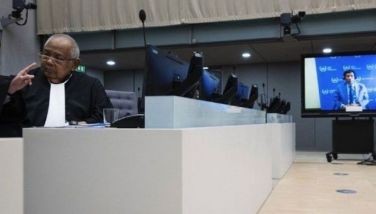Throwing away a treasure
November 20, 2006 | 12:00am
The much awarded movie Titanic ends with the leading lady throwing into the sea a very expensive ruby necklace. That necklace had been given to her and placed around her neck by a wealthy suitor during the fatal cruise of the Titanic. But during that cruise she meets and falls in love with a much poorer man who dies in the shipwreck. Her ruby necklace is one of the treasures that go down with the ship. Years later it is retrieved by divers and she gets it back, only to throw it away again into the sea.
Her gesture in throwing away such an expensive piece of jewelry is of course very impressive, but it is not quite clear why she does so. We can of course give to her action various interpretations.
Much clearer is the reason of Prospero in Shakespeare’s play, The Tempest, in throwing his magic book into the sea. Exiled to a deserted island, his book of magic gives him power over the hidden forces — the good ones represented by Ariel, and the evil ones represented by Caliban. But restored at last to his dukedom and reconciled to his former enemies who had treated him unjustly, he no longer needs his magic powers. He decides to get rid of his book of magic by drowning it in the sea: "But this rough magic I here abjure" he says, and then:
. . . . I’ll break my staff,
Bury it certain fathoms in the earth,
And deeper than did ever plummet sound,
I’ll drown my book. (Tempest, V.i)
A similar gesture, but more profound in meaning, occurs at the end of Rizal’s El Filibusterismo. The wounded Simoun flees for refuge to the house of the priest, Padre Florentino, situated near the sea. There Simoun dies. He leaves behind his treasure box containing a large fortune in jewelry as well as in gold and silver. Padre Florentino wonders what to do with all that treasure. This was what was left of the wealth with which Simoun had corrupted the government officials, from the highest to the lowest. This had been what caused so much evil in society. This money, left behind by the dead Simoun, could now be used for good and useful purposes. But it also could be used for further corruption. Padre Florentino takes the box, goes to a high rock overlooking the ocean and hurls the box into the sea. As he does so, the priest murmurs, talking to the treasure he has just thrown away,
May nature hide you among the corals and pearls of the eternal seas. If ever men should need you for a good and holy purpose, God will know how to retrieve you from the bottom of the ocean. Meanwhile, hidden away in its depths, you will not be used for evil, to violate human rights, to foment avarice.
Rizal realized what a source of evil the possession of money could be. Money is useful for good causes. More often it is used for evil. If all our government officials were poor and remained poor, we might perhaps have a just society. But an oligarchy of multimillionaires (or those who wish to become multimillionaires) is an evil thing.
Her gesture in throwing away such an expensive piece of jewelry is of course very impressive, but it is not quite clear why she does so. We can of course give to her action various interpretations.

Much clearer is the reason of Prospero in Shakespeare’s play, The Tempest, in throwing his magic book into the sea. Exiled to a deserted island, his book of magic gives him power over the hidden forces — the good ones represented by Ariel, and the evil ones represented by Caliban. But restored at last to his dukedom and reconciled to his former enemies who had treated him unjustly, he no longer needs his magic powers. He decides to get rid of his book of magic by drowning it in the sea: "But this rough magic I here abjure" he says, and then:
. . . . I’ll break my staff,
Bury it certain fathoms in the earth,
And deeper than did ever plummet sound,
I’ll drown my book. (Tempest, V.i)
A similar gesture, but more profound in meaning, occurs at the end of Rizal’s El Filibusterismo. The wounded Simoun flees for refuge to the house of the priest, Padre Florentino, situated near the sea. There Simoun dies. He leaves behind his treasure box containing a large fortune in jewelry as well as in gold and silver. Padre Florentino wonders what to do with all that treasure. This was what was left of the wealth with which Simoun had corrupted the government officials, from the highest to the lowest. This had been what caused so much evil in society. This money, left behind by the dead Simoun, could now be used for good and useful purposes. But it also could be used for further corruption. Padre Florentino takes the box, goes to a high rock overlooking the ocean and hurls the box into the sea. As he does so, the priest murmurs, talking to the treasure he has just thrown away,
May nature hide you among the corals and pearls of the eternal seas. If ever men should need you for a good and holy purpose, God will know how to retrieve you from the bottom of the ocean. Meanwhile, hidden away in its depths, you will not be used for evil, to violate human rights, to foment avarice.
Rizal realized what a source of evil the possession of money could be. Money is useful for good causes. More often it is used for evil. If all our government officials were poor and remained poor, we might perhaps have a just society. But an oligarchy of multimillionaires (or those who wish to become multimillionaires) is an evil thing.
BrandSpace Articles
<
>
- Latest
- Trending
Trending
Latest
Trending
Latest
Recommended

April 28, 2025 - 12:00am

April 26, 2025 - 12:00am




























